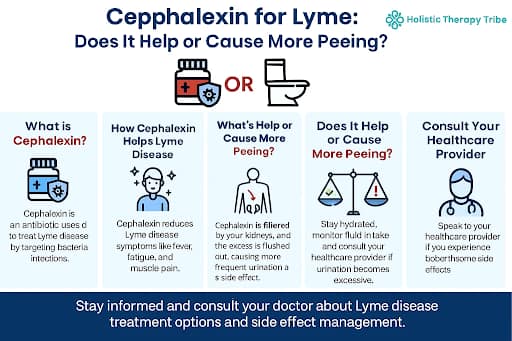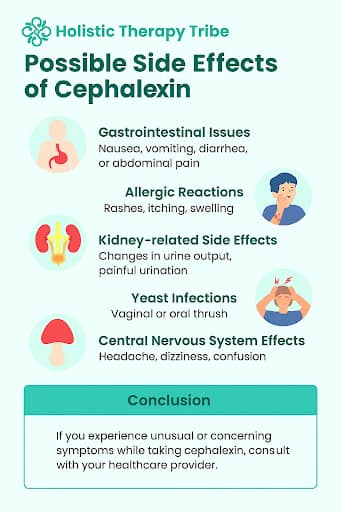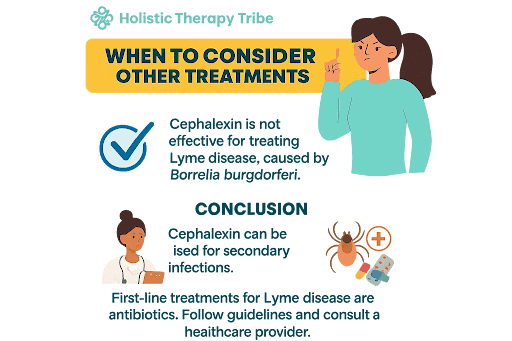
Lyme disease is referred to as a “great imitator” and is a complex illness that can easily be mistaken for other conditions. With the right knowledge and treatment plan, it is possible to reclaim your health and fight back.
So what is the secret to tackling Lyme disease?
Which antibiotics are your best allies in the battle?
Let us dive into this condition and tap into the treatment options that can make a real difference.
Effectiveness of Cephalexin in Treating Lyme Disease
- Cephalexin is not typically recommended for treating an individual with Lyme disease.
- Cephalexin is an effective antibiotic for treating varied bacterial infections. But it is not effective against Lyme disease as it has limited ability to target the spirochetes like Borrelia burgdorferi bacteria.
- Cephalexin can be prescribed in secondary cases where the Lyme disease patients develop secondary bacterial infections.
- For instance, skin infections such as cellulitis or impetigo might arise during chronic Lyme conditions. So in such cases, one can treat these secondary infections, but cephalexin cannot directly treat the underlying Lyme disease.
- For treating Lyme disease, first- line antibiotics are the standard and most effective choices.
The Link Between Cephalexin and Urination

Cephalexin is not associated with notable changes in urination. However, some individuals do experience increased urination as a side effect. This is not a primary side effect of the medication but can occur in certain cases. For instance, when an individual is sensitive to changes in fluid balance or patients with pre-existing kidney conditions and so on..
Let us understand in what cases an individual might experience excessive urination:
- Kidney functioning: Cephalexin is eliminated through the kidneys. In few individuals, the medication causes changes in kidney function that might as well lead to increased urine output.
- Diuretic Effect: It is not a direct diuretic (substance that increases urination). Cephalexin’s interaction with certain medications or conditions can increase the urination.
- Hydration Response: Antibiotic treatment might increase fluid intake due to the natural responses of the body to infectious state or dehydration.
What You Should Know About Cephalexin and Lyme Disease

PROS of using Cephalexin for Lyme Disease
- Effective against Secondary Infections: Cephalexin is effective against certain gram- positive bacteria that causes secondary infections such as cellulitis or impetigo in Lyme patients.
- Tolerance: Patients if prescribed by cephalexin for secondary infections, should know that the drug is well- tolerated in the body. It has relatively milder side effects, compared to other antibiotics.
- Convenience: Cephalexin is taken through oral administration; and that makes it a convenient option for patients who do not need intravenous antibiotics, in non- serious secondary infections.
CONS of using Cephalexin for Lyme Disease
- Not Effective Against Lyme- Causing Bacteria: Cephalexin does not target Borrelia burgdorferi bacteria. It is used in Lyme disease to manage the secondary bacterial infections, but not the disease itself.
- Potential Side Effects: As discussed, it is generally safe but it cause side effects such gastrointestinal problems, allergic reactions, excess urination in some cases.
- Resistance to Antibiotics: Overuse of cephalexin can cause antibiotic resistance that seems to be a growing concern in treating Lyme and other secondary infections.
Consulting Your Doctor: Personalized Treatment
Is it really needed to see or consult a doctor? Yes, irrespective of the situation or circumstances- it is crucial to consult a doctor before opting for any medications or treatment.
And as we are dealing with Lyme disease, a more personalized treatment plan is needed.Lyme disease is at different stages presenting varied symptoms for different individuals. Thereby, it is advised one to not follow the regimen or treatment plan to fellow patients or individuals suffering Lyme disease.
Let us understand why it is crucial to consult healthcare provider and you why one should not follow blindly:
- Correct Diagnosis and Treatment: As we are well aware of, Lyme disease is a great imitator of other conditions. Thereby in order to reach a correct diagnosis by combining clinical examination, lab tests, and a detailed history. A more tailored and personalized plan aids in improving your condition and health status.
- Antibiotic Treatment: Not all antibiotics are suitable for everyone. Factors such as antibiotic resistance, allergies to certain antibiotics and so on are important to take note of.
- Co-infections: Tick related co- infections such as Babesia, Ehrlichia, Anaplasma, and so on do exist along with Lyme disease. Your doctor can identify those and also address the additional infections along with Lyme disease.
- Chronic Management: Consulting healthcare professionals regularly ensures that the symptomatic treatment is aiding you effectively. Changes in treatment plan or adjustments if needed. This can be only noticed by healthcare professionals unlike by an individual with relatively less health literacy.
Conclusion
- Cephalexin is not typically recommended for treating an individual with Lyme disease. Cephalexin is an effective antibiotic for treating varied secondary bacterial infections.
- Cephalexin is not associated with notable changes in urination. However, some individuals do experience increased urination as a side effect.
- By tailoring treatment to your specific needs and addressing potential side effects, your doctor can guide you through the healing process while ensuring that the treatment is both safe and effective. Always consult your healthcare provider before making any changes to your medication regimen or treatment plan.
What’s Next for You?
Ready to explore a more complete path to recovery? Join the Lyme Support Network Community.


